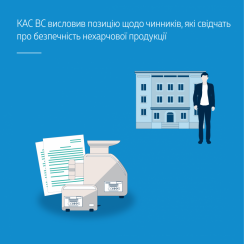Contact center of the Ukrainian Judiciary 044 207-35-46

An individual entrepreneur appealed to the court the decisions and resolutions of the Main Department of the State Service of Ukraine on Food Safety and Consumer Protection on the adoption of restrictive (corrective) measures and the imposition of penalties due to non-compliance of products with the requirements, namely, the lack of information about the importer on electrical appliances, as well as incomplete information on measures for the safe use of the appliance.
In denying the claims, the court of first instance proceeded from the fact that the lack of complete information required by technical regulations and state standards regarding the products was, under the specific circumstances of the case and taking into account the risk assessment, a reason to believe that such products posed a high level of danger to consumers, it was therefore lawful for the defendant to apply restrictive measures against such products, giving the plaintiff a period of time to remedy the violations.
Instead, the court of appeal noted that since the examination found only a slight discrepancy between the selected products and the DSTU norms (National Standards of Ukraine) regarding the absence of provisions on the use of products by children under 8 years of age and persons with disabilities, and the warning of possible injuries from improper use and information on the type of cord attachment and replacement, then such products shall not be considered dangerous and, accordingly, the application by the defendant of restrictive measures for such products shall be unlawful.
The Supreme Court composed of a panel of judges of the Administrative Cassation Court satisfied the cassation complaint of the Main Department of the State Service of Ukraine on Food Safety and Consumer Protection, cancelled the decision of the court of appeal, and upheld the decision of the court of first instance.
Based on the analysis of articles 1 and 5 of the Law of Ukraine On the General Safety of Non-Food Products, the court concluded that non-food products were considered safe if they did not pose any risk or constituted only minimal risks associated with the use of such products, in particular, if such products complied with national standards harmonized with the relevant European standards, technical regulations, expectations of consumers (users) regarding the safety of products under normal or reasonably expected conditions of their use, including the specifics of the use of such products by certain categories of persons.
Therefore, household appliances, other non-food products, for which there is no complete and comprehensive information on the safety of their use, reservations for the consumption or use of products by certain categories of the population (children, pregnant women, the elderly, etc.), as well as information on other important warnings regarding the method and features of their use, cannot be considered safe, since they can pose a threat to the life and health of a person if the relevant conditions and reservations regarding their use are not observed.
At the same time, the state standard and technical regulations clearly define the requirements for the volume and completeness of information that should be found, in particular, in the equipment operating instructions, so the absence of such information is a reason to believe that the corresponding products do not meet state standards and technical regulations.
In addition, as established by the courts of previous instances, the decisions to take restrictive (corrective) measures were not implemented within a specified period, in particular through cooperation with business entities in the supply chain in accordance with the requirements of Art. 30 of the Law of Ukraine On State Market Supervision and Control of Non-Food Products.
The court noted that business entities in the supply chain were not only the person from whom the products were purchased, but also the manufacturer of the products, the importer. At the same time, in order to eliminate the formal discrepancy, to bring the products in line with the established requirements, the business entity has the right to contact any business entity in the supply chain, including the manufacturer of these products, and also to take all possible measures to notify the supplier of the detected non-compliance with the established requirements.
The law does not limit the distributors, who contrary to the requirements of the current legislation were provided on the market with products that do not meet the established requirements, in choosing ways to cooperate with business entities in the supply chain in order to eliminate formal non-compliance. However, the need for effective cooperation among themselves in order to ensure the conformity of products with established requirements is defined as a duty in order to achieve the goals established by the Law.
The court pointed out that the distributor, before placing the product on the market, should ensure that the product meets the established requirements. Yet the plaintiff did not do this and provided the products that did not meet the established requirements on the market.
Resolution of the Supreme Court of September 07, 2022, in case No. 440/539/21 (administrative proceedings No. К/990/3442/22) – https://reyestr.court.gov.ua/Review/106116390.
This and other legal positions of the Supreme Court can be found in the Database of Legal Positions of the Supreme Court - lpd.court.gov.ua/login.